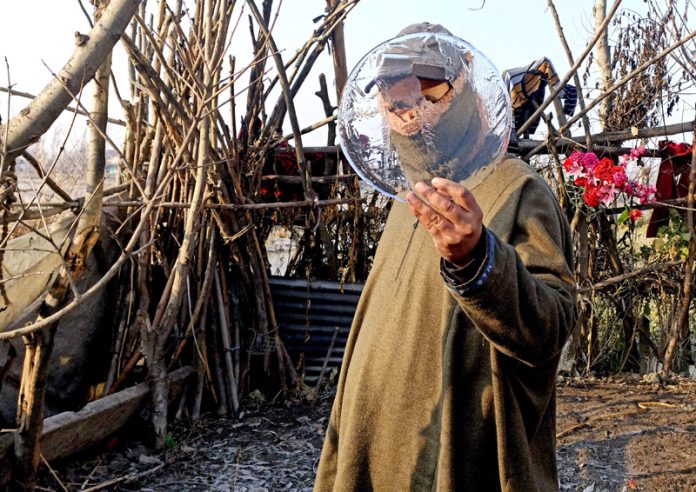Excelsior Correspondent
SRINAGAR, Feb 8: The night temperatures plummeted in Kashmir today with Srinagar recording the coldest night of February at minus 5.2°C while the day temperatures across the region rose and stayed above normal for the first time this month.
Srinagar recorded a low of minus 5.2°C against minus 2.0°C the previous night and it was below normal by 4.8°C for the city for this time of the year. On 9 February 2019, Srinagar had recorded minus 5.7°C while all-time-low for the city was witnessed on 6 February 1985 when mercury plummeted to minus 20°C. Today’s night was coldest in the month of February this year.
Qazigund recorded a minimum of minus 6.4°C against minus 3.2°C the previous night. The minimum temperature was 4.9°C below normal for the town.
Pahalgam recorded a low of minus 11.9°C against minus 10.8°C the previous night and it was 5.7°C below normal for the resort.
Kokernag recorded a minimum of minus 4.5°C against minus 4.3°C the previous night and the temperature was below normal by 2.5°C for the place.
Kupwara recorded a low of minus 4.5°C against minus 3.3°C the previous night and it was 3.4°C below normal there.
Gulmarg recorded a low of minus 12.0°C against minus 10.0°C the previous night and the temperature was below normal by 3.4°C for the skiing resort.
Srinagar recorded a maximum of 11.0 degree Celsius temperature today which was 1.8 degree Celsius above normal for the city for this time of the year.
Qazigund recorded a maximum of 9.6 degree Celsius which is 0.5 degree Celsius above normal for the place during this time of the year.
Pahalgam recorded a maximum of 7.0 degree Celsius which is 1.1 degree Celsius above normal for the place during this time of the year.
Kupwara recorded a maximum of 10.5 degree Celsius which is 1.9 degree Celsius above normal for the place during this time of the year.
Kokernag recorded a maximum of 8.7 degree Celsius which is 1. 5 degree Celsius above normal for the place during this time of the year.
Gulmarg recorded a maximum of 2.2 degree Celsius which is 0.8 degree Celsius above normal for the place during this time of the year.
A Meteorological Department official said that the weather is expected to be dry till February 17.
“Overall, dry weather is expected till February 17 with occasionally cloudy evenings during February 14.”
Regarding the outlook during February 18-20, he said, there is a possibility of light snow and rain.
As ‘Chillai-Kalan’, the 40-day harsh period of winter ended on January 29, Kashmir is presently in the middle of 20-day-long winter period called ‘Chillai-Khurd’ that ends on February 18 and is followed by a 10-day-long period ‘Chillai-Bachha’ (baby cold) which starts from February 19 to February 28.
Meanwhile, the weather patterns in Jammu and Kashmir have undergone a significant transformation this year, marking a notable departure from the norm, with January witnessing the driest conditions in over four decades.
As per the Meteorological Department of Kashmir, across various stations in the region, including prominent ones like Srinagar, Gulmarg and Banihal, January stood out for its unusually dry and warm conditions.
Srinagar recorded a mean maximum temperature (Tmax) of 11.9°C, Gulmarg at 5.7°C, and Banihal at 16.9°C, marking the highest temperatures observed in over 40 years. Conversely, Jammu experienced its lowest mean Tmax since 1983, with temperatures recorded at 13.4°C.
Furthermore, the MeT said the mean minimum temperature (Tmin) for key areas such as Srinagar, Jammu, Gulmarg, and Banihal was -3.2°C, 5.5°C, -3.9°C, and 0.1°C, respectively. Notably, Gulmarg’s mean minimum temperature for 2024 ranked among the highest in the last 43 years.
In terms of precipitation, MET said, the figures tell a story of stark contrast. Srinagar received a mere 3.0 mm of rainfall, while Gulmarg recorded 42.3 mm and Banihal 14.6 mm.
Trending Now
E-Paper


